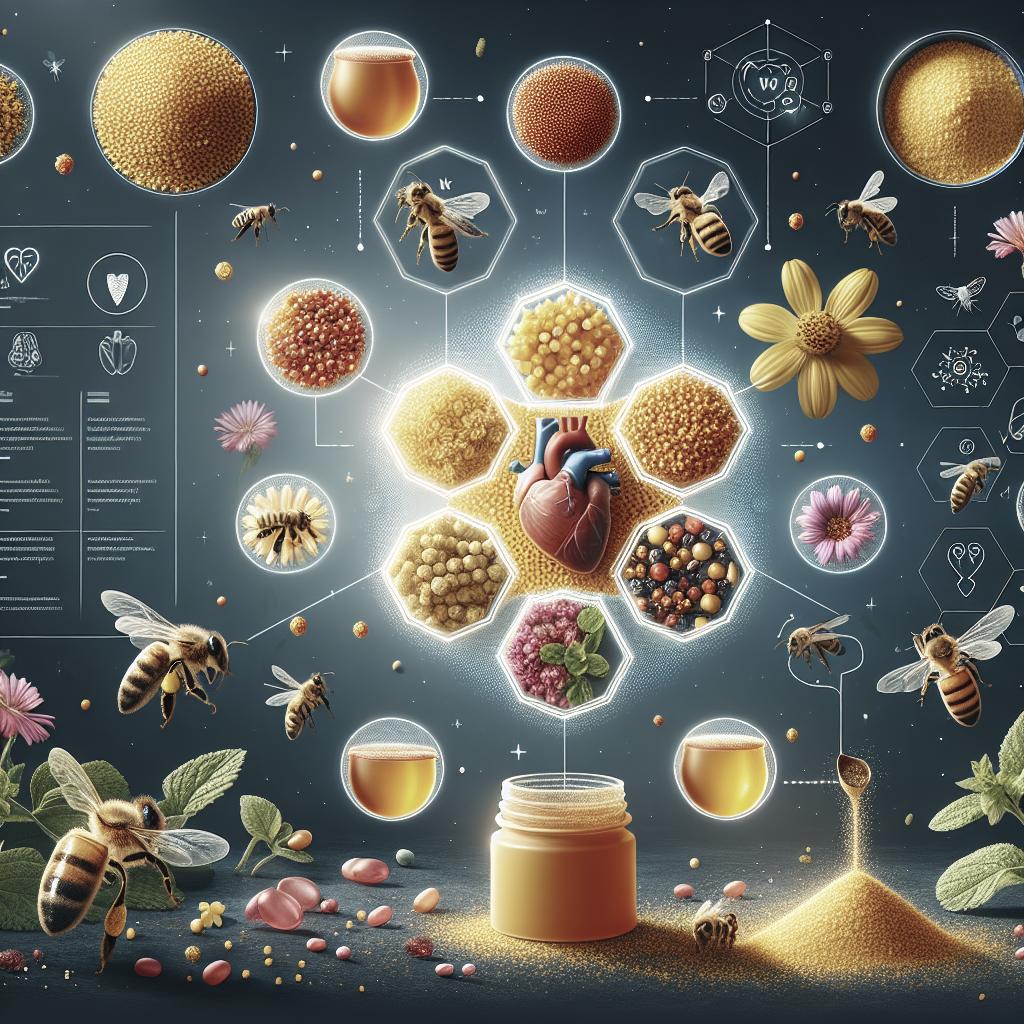Bee Pollen: The Nutritional Powerhouse
Bee pollen has intrigued health enthusiasts and researchers alike, hailed for its myriad
nutritional benefits. This blog post delves into the composition of bee pollen, highlighting its role as a rich
source of essential nutrients. We’ll explore scientific insights into how bee pollen can relieve inflammation,
act as an antioxidant, and bolster liver health. It also enhances the immune system, supports menopause
symptoms, reduces stress, and speeds up healing. However, despite its benefits, bee pollen has side effects and
contraindications. So, are the buzzworthy benefits of bee pollen for real? Let’s explore this superfood’s
nutritional promise and potential caveats.
What is bee pollen?
Bee pollen is a granular substance collected by honeybees. Bees gather pollen from flowers and mix it with
nectar and honey to create this nutritious compound, storing it in their hives as a food source. It is often
touted as nature’s perfect food because it comprises vitamins, minerals, proteins, and fats.
This unique blend of nutrients results from the diverse flora bees visit, making bee pollen a complex and
complete dietary additive. Its reputation is not new; bee pollen has been part of traditional medicine for
thousands of years, associated with vitality and health. Modern science is beginning to unravel why this simple
substance holds such promise.
Nutrition facts
Bee pollen is a nutritionally dense substance. It contains protein, typically making up about 20-35% of its
weight, with a rich concentration of essential amino acids vital for bodily functions. Pollen is abundant in
vitamins, including B1, B2, B3, B5, B6, C, E, and crucial minerals like zinc, magnesium, and calcium. These
nutrients play fundamental roles in energy production, immune function, and maintaining healthy skin and hair.
The presence of antioxidants, such as flavonoids and carotenoids, further enhances its nutritional profile.
These compounds help protect cells from oxidative stress and have been linked to reduced risk of chronic
diseases. Bee pollen’s unique composition also includes enzymes, fibers, and healthy fats that are beneficial
for digestion and heart health.
What the research says
Relieving inflammation
Recent studies have shown that bee pollen contains anti-inflammatory properties. Scientists believe that the
presence of flavonoids and phenolic acids provides significant anti-inflammatory benefits, making it a natural
remedy for various inflammatory conditions. These compounds can modulate the body’s inflammatory response,
offering relief in conditions like arthritis and other inflammatory diseases.
The anti-inflammatory effects of bee pollen are comparable to commonly used anti-inflammatory medications but
without some adverse effects. Including bee pollen in the diet provides a natural, holistic approach to managing
inflammation and pain.
Working as an antioxidant
Antioxidants are essential in counteracting the damage caused by free radicals, unstable molecules that can
lead to cellular damage and aging. Bee pollen is rich in antioxidants, which neutralize these free radicals.
Several studies have highlighted the high antioxidant content in bee pollen, comparable to that found in fruits
and vegetables.
The polyphenols, flavonoids, and carotenoids in bee pollen are particularly noted for their ability to scavenge
free radicals. Regular inclusion of bee pollen in the diet may help in reducing oxidative stress, thereby
lowering the risk of chronic diseases such as cancer and heart disease.
Boosting liver health
The liver plays an essential role in detoxification and metabolic processes. Bee pollen has been identified as
beneficial for liver health due to its potent antioxidant properties and its ability to promote the regeneration
of liver cells. Research suggests that bee pollen can protect the liver against damage from toxic substances,
enhancing its ability to function effectively.
For individuals dealing with liver issues, incorporating bee pollen into the diet may offer a natural strategy
to support liver health. It helps to ward off conditions such as fatty liver disease and promotes better
metabolic health.
Strengthening the immune system
Bee pollen is known to boost the immune system, thanks to its abundant supply of vitamins, minerals, and
antioxidants. These nutrients work together to enhance the body’s defenses against pathogens and diseases.
Research has demonstrated that bee pollen can stimulate immune responses and improve resistance to infections.
With its immune-enhancing properties, bee pollen can be a valuable dietary addition, especially during flu
seasons or periods of increased physical or psychological stress. It reinforces the body’s natural defenses,
helping to maintain optimum health.
Working as a dietary supplement
Due to its diverse nutritional profile, bee pollen is often used as a dietary supplement to fill nutritional
gaps. It provides a concentrated source of proteins, essential fatty acids, and micronutrients, making it an
ideal choice for individuals looking to enhance their diet naturally.
Athletes and those pursuing physically demanding lifestyles may find bee pollen particularly beneficial as it
offers sustained energy and aids recovery. It also supports overall wellness by ensuring adequate nutrient
intake, crucial for health and well-being.
Easing symptoms of menopause
The hormonal changes during menopause can lead to various unwanted symptoms, such as hot flashes and
fluctuations in mood. Bee pollen has earned attention for potentially alleviating these symptoms, due to its
capacity to modulate hormonal activity and improve overall vitality.
Some studies have indicated that women taking bee pollen supplements have reported a reduction in menopausal
symptoms and an improvement in their quality of life. While further research is necessary, these findings offer
hope for a natural solution to managing menopausal discomfort.
Reducing stress
Bee pollen may act as a natural stress reliever, benefiting the nervous system through its rich store of
essential nutrients and adaptogenic properties. Adaptogens help the body cope with stress, aiding in resilience
and recovery from mental and physical stressors.
Incorporating bee pollen into the diet may support mental health by promoting calmness and balance, important
in today’s fast-paced world. For those experiencing high stress levels, its adaptogenic properties provide a
dietary ally in stress management.
Speeding healing
Bee pollen has a long history in folk medicine as a healer’s aid, valued for its wound-healing properties. Its
capacity to enhance cellular proliferation and regeneration can speed up recovery from injuries and surgical
procedures.
The vitamins and minerals in bee pollen support skin health and repair processes. By promoting faster tissue
regeneration, bee pollen can be a vital element in personal care regimens, especially for those looking to
enhance healing and reduce scarring.
What are the side effects of bee pollen?
Despite its numerous benefits, bee pollen may not be suitable for everyone. Some individuals may experience
allergic reactions, especially those allergic to pollen or bee stings. Symptoms can range from mild
irritation to severe anaphylaxis, so caution is advised.
People with asthma, pregnant women, and those on certain medications should consult with a healthcare
professional before incorporating bee pollen into their diet, especially considering potential interactions and
side effects. As with any supplement, it’s essential to start with small quantities to gauge personal tolerance
and avoid adverse reactions.
Takeaway
Bee pollen holds considerable promise as a nutritional powerhouse, with benefits verified by emerging research.
It offers a wide range of health-enhancing properties, from boosting immunity to supporting liver health and
reducing stress. However, potential users must consider the possibility of allergic reactions and consult
healthcare providers, especially those predisposed to allergies or with underlying health conditions.
Ultimately, bee pollen can be a valuable addition to a balanced diet. Ensuring safe usage and adherence to
recommended guidelines will allow those interested in exploring this natural remedy to fully reap its numerous
health benefits.
| Benefits | Details |
|---|---|
| Relieves inflammation | Bee pollen contains flavonoids, offering anti-inflammatory benefits. |
| Acts as an antioxidant | Rich in antioxidants like flavonoids and carotenoids, bee pollen reduces oxidative stress. |
| Boosts liver health | Protects and promotes regeneration of liver cells, supporting detoxification. |
| Strengthens the immune system | Vitamins and antioxidants enhance immune response and disease resistance. |
| Works as a dietary supplement | Provides a comprehensive blend of essential nutrients for overall wellness. |
| Eases symptoms of menopause | Modulates hormones to reduce symptoms like hot flashes and mood swings. |
| Reduces stress | Adaptogenic properties help manage mental and physical stress. |
| Speeds healing | Enhances tissue regeneration and supports skin repair. |
Incorporating bee pollen into your lifestyle can be both nourishing and enriching, but starting with
professional guidance ensures the maximum benefit with minimal risk


